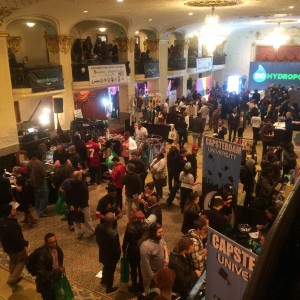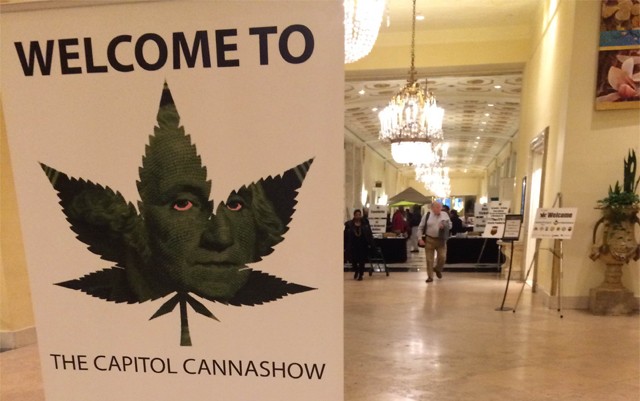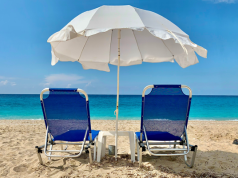One year since legalizing marijuana in Washington, D.C., during a warm break in the weather this past Saturday, the prestigious Renaissance Mayflower Hotel in Washington D.C. added another historic milestone to its reputation as host of the Capitol CannaShow, the largest local business and advocacy-focused cannabis conference in the nation’s capital.
With over 2,000 attendees, vendors, and volunteers over the course of the day, it was the largest locally sourced cannabis conference and expo on the District has ever seen to date.
Organizations for cannabis and drug policy reform like the National Organization for Marijuana Reform (NORML) and Students for Sensible Drug Policy (SSDP) filled the grand foyer as “cannabusinesses,” or cannabis-culture oriented businesses, both large and small lined the beautifully gilded Grand Ballroom and its balcony.

Genevieve, a volunteer for one local business, Hemp Kettle Tea Company, compared the Capitol CannaShow with the recent, yet poorly attended, High Times Business Summit. “I thought this event was better organized and more publicized than High Times and I loved the energy from everyone. I loved the exchange of knowledge.”

Another reason for the difference in attendance and popularity may have been the price for attendees and vendors.
Capitol CannaShow attendee passes were $15 with Groupon specials, which were widely promoted through social media. The minimum sponsorship level for the show was $250. In comparison, the High Times Business Summit’s 1-day Seminar and Exhibition passes for attendees were a steep $125. Vendor packets for the business summit were not highly publicized on the local level, but minimum sponsorship levels were reported to be upwards of several hundred dollars.
The vendor booths in the ballroom clearly demonstrated that the DC cannabis community is making a statement that marijuana reform is happening and they are open for business.
Drop by the #Mayflower hotel in #DC today. #CannaShow is great turn out @GoCannaShow cc @cmdgrosso pic.twitter.com/lQYJWqWdLj
— Capitol Hemp (@CapitolHemp) February 20, 2016
https://www.facebook.com/DistrictKaraoke/posts/948482025236956
While the Grand Ballroom bustled, an impressive list of cannabis advocates, lawmakers, and cultivators took the stage in the main conference room to a standing room only crowd.
AMAZING TURNOUT: By 10:30am eager to learn #CapitolCannaShow attendees packed the house. *Standing room only* pic.twitter.com/crDMGi0HUn
— Lauren N. Jarema (@JaremaJams) February 20, 2016
Director of Industry Analytics for Frontier Financials, John Kagia, spoke at the conference, giving advice on upcoming trends to an eager audience. The New York Times recently cited cannabis data analyst firm, Frontier Financials’ figure that $5.4 billion was spent on legal marijuana sales in 2015.
NF Director of Analytics @jkagia presenting on trends in the #cannabis industry for #DC entrepreneurs @DCCannaShow. pic.twitter.com/N69wmvRIgE
— New Frontier (@NewFrontierData) February 20, 2016
The keynote speaker, Adam Eidinger, is known for his role in spearheading Initiative 71 – the measure that legalized cannabis in D.C. exactly one year ago. Eidinger gave a brief history on the War on Drugs and his run-in with the law and when he refused to give his urine sample. “Everyone in jail ended up throwing their piss cups on the floor with me,” he recounted. His words turned into a warning when he advised businesses in the green space to be extra careful not to break any rules when it comes to current cannabis law, which specifically states that “a person can still be arrested for selling any amount of marijuana to another person.”
.@aeidinger: legitimate businesses must be careful not to mix ?and ganja in DC right now. #CannaShow #DC @DCMJ2014 pic.twitter.com/PiNswvjaSJ
— Chloe Palma (@ChloePalma) February 20, 2016
As a lifelong activist who ran the successful voter campaign to legalize cannabis in the District, Eidinger said the single most important thing anyone can do is vote, “I need you all to vote. It’s that simple.”
D.C. Councilman David Grosso (I-At Large) addressed the hottest issue surrounding cannabis in the District right now by slamming the cannabis club task force created by D.C. Mayor Muriel Bowser’s administration. Currently, the measure to legalize and regulate cannabis clubs has been shelved for further deliberation. Grosso remarked that it was a “waste of time,” adding that he would rather see more action and less talk on the issue.
.@cmdgrosso @aeidinger to talk about the future of canna clubs in DC #cannashow pic.twitter.com/uHqhtEk4YY
— Chloe Palma (@ChloePalma) February 20, 2016
Although he is a firm supporter of medical marijuana since residents first voted in favor of it in 1998, Grosso took a cautious tone when it comes to the future of cannabis clubs. “It’s fair to consider the entire community,” Grosso added, “the public needs to see there will be regulation of marijuana.”
The councilman also called upon the federal government to back off when it comes to its unique rule over the District of Columbia. The District has no votes or representation in Congress but must yield to Congressional decisions. Much to the chagrin of DC residents, cannabis rights became a negotiable item as in the case of pharmaceutical industry-funded Maryland Representative Andy Harris. When it comes to cannabis in the District, Grosso stated, “I’m frustrated there is no pushback of Congress for more D.C. autonomy.”
The panel of regional medical marijuana experts present agreed that the number one issue they are facing today is the lack of authorized lab testing for plants and they say the DC cannabis community, in general, is in need of guidance on Tetrahydrocannabinol (THC) levels for edibles.
DC needs authorized lab testing and guidance on THC levels for edibles – #cannashow health and wellness panel pic.twitter.com/EMCXgn6PWd
— Chloe Palma (@ChloePalma) February 20, 2016
On the heels of testifying at a city hearing on performance of D.C’s health and human services, Rabbi Jeffrey Kahn, owner of the D.C. medical marijuana dispensary Takoma Wellness Center, continued to push for an end on the limits of the amount of medicine he is allowed to give out to patients. Currently, there are weight and monthly limits on the amounts of medical cannabis that can be accessed at District dispensaries. “We have a long way to go,” said the Rabbi.
Alaskan news reporter turned ganjapreneur, Charlo Greene, who rose to fame after quitting her job during a live broadcast, gave closing remarks. She ended the conference with a call to action for community members to represent themselves in the emerging market. She offered resources and opportunities to help diversify the green industry through her organization Go Greene. Aimed at getting communities involved in the green revolutions going on throughout the country, Go Greene’s mission is “to help rebuild the communities harmed by prohibition most.” Greene rallied the audience, saying that the end of prohibition is near. “This is our time and if we don’t act right now while the foundation is being laid we won’t be able to be a part of anything that’s happening,” proclaimed Greene.
https://www.facebook.com/gocharlogreene/videos/vb.726646827389430/962107163843394/?type=2&theater
THE EAST COAST TAKES THE LIMELIGHT
States like California, Colorado, Oregon, and Nevada are the usual hosts of the wildly popular High Times Cannabis Cup, International Cannabis Business Conference, and the Marijuana Business Conference and Expo for years. However, as more states give marijuana the green light, more venues across America will be willing to host these types of events.
In 2015 alone, Manhattan and D.C. hosted business events for national organizations like the National Cannabis Industry Association (NCIA) and High Times. Now two months into 2016, D.C. has successfully put on its first locally sourced conference which has set the bar high for the first annual National Cannabis Festival on April 23rd. Located at the fairgrounds at RFK stadium on the highly regarded weekend of 4/20, the festival is described as “an event celebrating progress on marijuana legalization in DC and across the nation […] recognizing the spirit of the cannabis movement and the non-profit groups that have fought for so long to end marijuana prohibition.”
Colorado made more than 70 million dollars in marijuana taxes last year. The New York Times reported 5.4 billion dollars in legal sales of cannabis for 2015, and the report summary stated that by 2020, legal market sales were forecast to be $21.8 billion.
While not technically a state, DC is enjoying its nascence as a new member of the small group of states with legalized cannabis. The District of Columbia is making history one stem at a time with events like the Capitol CannaShow. An event of this size with a prestigious venue and local affiliations has left people like this Instagram user wanting more.
D.C. has legalized adult use and medical marijuana, but it’s still federally illegal. Located around the Capitol grounds, lawmakers and officers remind entrepreneurs and supporters the importance of knowing the local laws and to keep their grass off of federal land.
Minna Nilanont, M.Ed and owner of Hemp Kettle Tea Company, contributed to this report.






